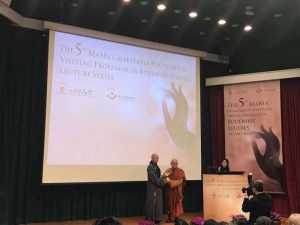
Are the Three Essentials—faith, aspiration and practice—“conditions” for Rebirth?
According to Amitabha’s 18th Vow, we need three essentials, also known as “credentials” (faith, aspiration, and practice) for rebirth in Amitabha’s Land of Bliss. Many Pure Land practitioners take these essentials as “conditions” for rebirth, and strive to practice the meditative and non-meditative, worldly and transcendental virtues, so as to fulfill them.
However, despite their diligence in various practices, these practitioners often feel uncertain about rebirth. This is because their faith is not adequately sincere, their aspiration is not adequately earnest, and their practice is not adequately “skillful.” Even worse: no one knows when he or she will die, or under what circumstances. If we die without having fulfilled the “conditions” for rebirth, then our precious human lifetime was spent in vain.
Uncertainty means anxiety. The situation is similar to a student who wishes to be admitted to a high-ranking university. No matter how hard he studies for the examination, there is no 100 per cent guarantee that he will be admitted by the university. Not until he receives the confirmation letter will he feel at ease.
Here it should be noted that our world is a conditioned realm of birth and death; all phenomena change according to conditions, so they are impermanent. This includes the mind, and any mental state we may try to cultivate: the mind of faith, the mind of aspiration, the mind of renunciation, and so on.
So if we take faith, aspiration, and practice as the “conditions” for assured rebirth, and attempt to fulfill them by our own efforts through the intensive practice of meditative and non-meditative, worldly and transcendental virtues, we will not attain assured rebirth in this present lifetime.
Three Essentials—faith, aspiration, and practice as “gifts” from Amitabha
One of the characteristics of the pristine Pure Land teaching in the patriarchal lineage of Master Shandao is that an aspirant’s rebirth in Amitabha’s Land of Bliss is assured in this present lifetime. It is the natural outcome of “name-recitation in accordance with Amitabha’s Fundamental Vow,” which is another characteristic of the Pure Land school.
Pure Land is a teaching of Amitabha’s deliverance through the power of his Fundamental Vow. So, any sentient being of the Ten Directions who aspires to be reborn and recites Amitabha’s Name will be instantly assured of rebirth. This is Amitabha’s offer to all of us, which is forever in effect.
What we believe (faith) about the Fundamental Vow is this: we attain rebirth in Amitabha’s land by reciting his name for the remainder of our lives—even as few as ten times.
What we wish for (aspiration) from the Fundamental Vow is this: rebirth in the Pure Land by reciting Amitabha’s name for the remainder of our lives—even as few as ten times.
So according to Amitabha’s Fundamental Vow, if we wish for rebirth in the Pure Land and practice the recitation of Amitabha’s name for the remainder of our lives, even if we learn of Amitabha’s deliverance on our deathbeds and can only repeat it ten times, we have already acquired “faith, aspiration, and practice,” the three essentials as stated in the Vow.
In other words, the three essentials of faith, aspiration, and practice that we need for rebirth in Amitabha’s Land of Bliss, are “gifts” from Amitabha Buddha, not “conditions” for rebirth. It is through these “gifts” that we can be reborn in his Pure Land.
Why is our rebirth assured by Name-recitation in accordance with the Fundamental Vow?
Our rebirth is certain because:
1. Amitabha is a Buddha who is real and eternal, omnipotent and omnipresent, perfectly enlightened in wisdom and unconditional in compassion.
2. Amitabha is a Buddha who fulfilled his Fundamental Vow 10 kalpas ago. This means his “offer” in the Fundamental Vow is still valid and in effect.
3. Amitabha is a Buddha who takes the form of unimpeded light permeating the Ten Worlds, protecting and embracing all those who recite his Name. So, he is readily available to deliver us under any circumstance, at all times.
4. Amitabha is a Buddha who appears near the end of our lives and receives all those who recite his Name in aspiration for rebirth. He never forsakes those who recite his Name.
Amitabha’s deliverance is pro-active because he takes the initiative to deliver us, without being invited. In addition, he gives us his Name, which is a method of deliverance that in no way depends upon our virtues or abilities.
Amitabha’s deliverance is unconditional because he has prepared all the “essentials,” including faith, aspiration, and the abundant roots of virtues and meritorious blessings necessary for rebirth in his splendid reward-land. Whoever recites his Name will attain them, absolutely free of charge.
Amitabha’s deliverance is equal because he does not discriminate between the good and the evil, the monastic and the layman, etc. There are no restrictions or taboos in practicing name-recitation, even though well-meaning teachers have imposed conditions or mixed other practices with name-recitation. Unfortunately, these conditions and admixtures have often blocked the way to Amitabha’s Pure Land for ordinary people.
To follow Amitabha’s teaching of deliverance by the power of his Fundamental Vow, it is critical not to interpret the Pure Land teaching through the conventional lens of self-powered cultivation in meditative and non-meditative virtues. All Pure Land teachings finally return to Amitabha’s Name, which is actually Amitabha himself in the form of unimpeded light. All three Pure Land sutras talk about the Name and nothing else.
* Amitabha’s 18th Vow: “If, when I attain Buddhahood, sentient beings in the lands of the Ten Quarters who sincerely and joyfully entrust themselves to me (faith), desire to be born in my land (aspiration), and call my Name, even ten times (practice), should not be born there, may I not attain perfect Enlightenment. Excluded, however, are those who commit the five gravest offences and abuse the right Dharma.”











